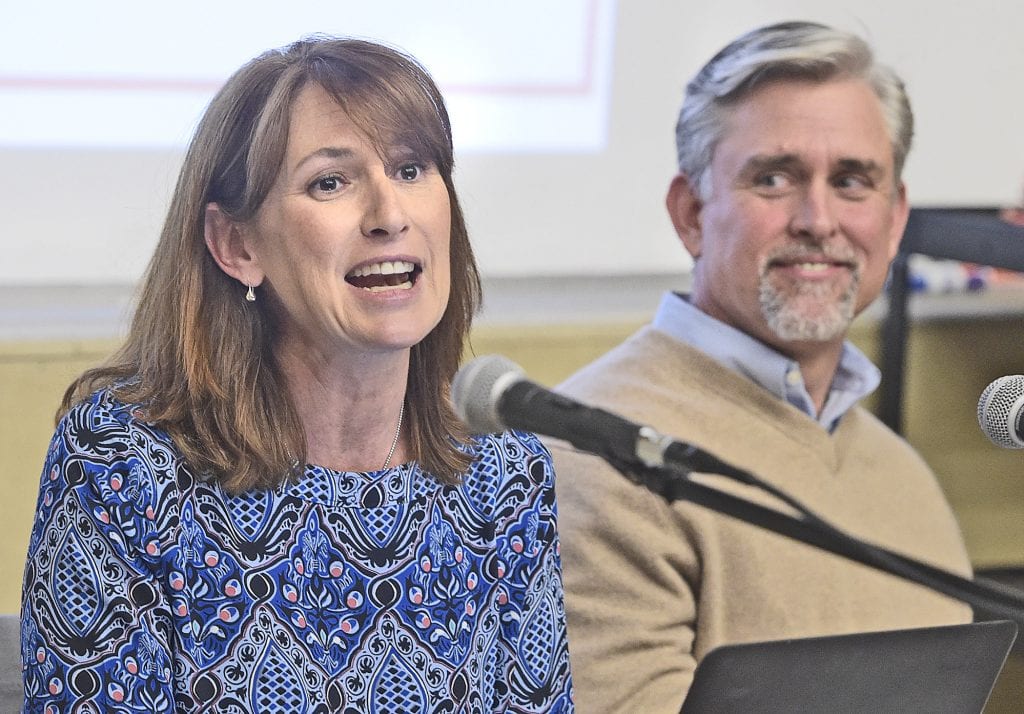“Fake News,” one of the latest buzzwords in the U.S. political sphere, was deliberated and evaluated by professors and students at College of the Canyons (COC) Wednesday.
The Fake News Forum, presented by COC’s Institute of Ethics, Law and Public Policy, consisted of four speakers and a Q&A session to tackle various topics surrounding truth seeking, the freedom of the press, news consumption and political culture.
“This is an issue about democracy and freedom of speech, and we want to look at fake news and how that works with our political system without really taking partisan views,” said forum moderator Kevin Anthony, director of the Institute and COC’s Hotel and Restaurant Management department chair.
Chris Blakey, a COC philosophy professor, defined fake news as known sites or groups of people who are posting made up news stories to make a profit; however, the phrase “fake news,” in reference to mainstream media, is different.

“The phrase ‘fake news’ is used regularly by President Trump and the administration to refer to mainstream, quite legitimate news sources, but always about things they don’t like or that is a criticism of the administration,” he said.
This difference between made up news stories and calling legitimate news stories fake has caused confusion among the public, Blakey said.
It has also made the public reevaluate the ethics and values of seeking the truth in what some believe is a post-truth society, where objective facts are less influential in shaping public opinion than appeals to emotion and personal beliefs.
“Truth matters in current affairs, we can find it and it’s worth finding,” Blakey said. “Truth is independent of what you or I want, prefer or like.”
David Andrus, COC’s political science department chair, said that truth is essential to democracy and political culture.
“If every objective truth is to be argued and challenged by a society primarily for political reasons, then how can that society function and co-exist?” he said. “I don’t think it can over time.”
Andrus said that this constant challenge to the United States’ political culture, or shared values and beliefs, is turning objective observations of the truth into partisan issues.
“When anyone talks about shared values and beliefs today, it gets morphed into politics,” he said. “Try to depersonalize your conversation. Ask each other… ‘What is it you think you have in common with people despite your political differences?’ And I think we’ll realize we have more in common than we think.”


Majid Mosleh, a COC political science professor and career advisor, said that in order to promote democracy and seek truth, many turn to the mass media of communications.
Citing quotes from the nation’s Founding Fathers, Mosleh noted that freedom of speech and freedom of the press is a fundamental element of the Bill of Rights and Constitution.
“A free and fully functional democracy depends on a free flow of information,” he said. “Democracy will not function in the absence of an independent media.”
The press, Mosleh said, has several key functions including facilitating political socialization, holding government accountable, publicizing issues that need attention, educating citizens to make informed decisions and setting the agenda for public discussions.


Lisa Hooper, a COC kinesiology professor, said it is the public’s responsibility to think about how they consume mainstream media and evaluate credible sources when seeking out and stumbling upon the news.
According to Hooper, individuals should look to be informed, rather than entertained or persuaded by news sources in order to receive factual information.
“If you’re truly looking to inform yourself, you really need to be thinking about these aspects of the news pieces that you’re consuming,” she said. “Is it intending to inform you? And if it is intending to inform you, it probably doesn’t need to be so entertaining or persuasive.”
[email protected]
661-287-5575
On Twitter as @_ChristinaCox_








